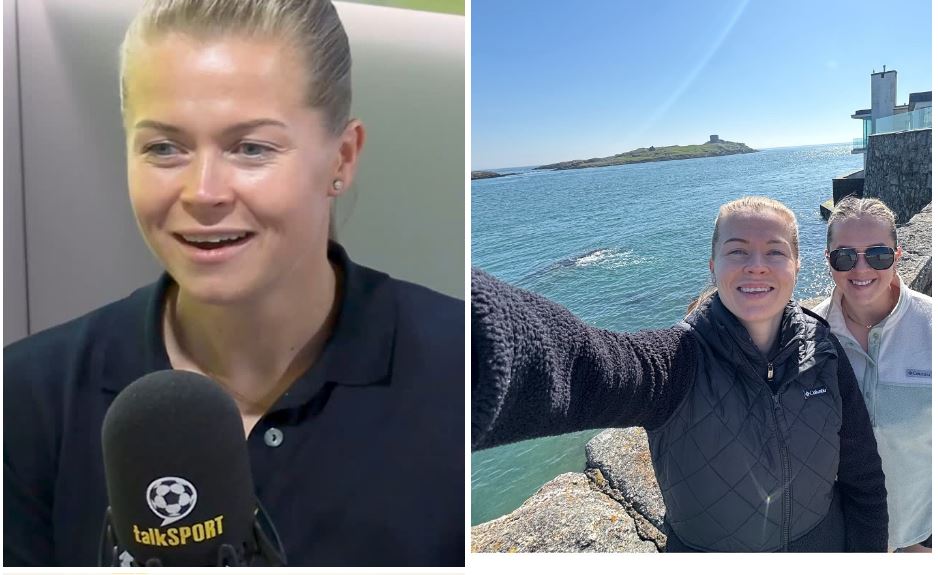In addition to establishing herself as a leader on the field, Katie McCabe openly managed a high-profile relationship during her incredible ascent through women’s football. She lived with fellow Irish international Ruesha Littlejohn for seven years, and many fans found this relationship to be both real and very reassuring. Their relationship was clearly based on respect for one another and professional cooperation rather than just romance.
They were able to keep up a relationship that was both private and public by playing together for Ireland. McCabe often commended them for their ability to keep their personal relationships apart from their national responsibilities. Fans and teammates alike praised them for their ability to handle on-field conflicts like seasoned teammates rather than partners, describing their chemistry as “passionate but professional.”
| Category | Details |
|---|---|
| Full Name | Katie Alison McCabe |
| Date of Birth | 21 September 1995 |
| Nationality | Irish |
| Position | Left Wing-back / Winger |
| Club | Arsenal W.F.C. |
| International Team | Republic of Ireland Women’s National Team |
| Ex-Girlfriend | Ruesha Littlejohn |
| Relationship Duration | 2016–2023 (7 years) |
| Current Partner | Caitlin Foord |
However, that ostensibly stable collaboration had quietly come to an end by early 2023. There were no dramatic declarations that followed, just a conspicuous lack. Looking back, the change seemed minor, but it had a big emotional impact. The fact that the two had split up right before the Women’s World Cup gave the revelation more weight.
In the months that followed, Katie’s personal life changed once more, becoming more obviously entwined with Caitlin Foord of Australia and Arsenal. Although they had always been close, recent posts on social media, especially about their trip to Rome, raised questions. Something more than friendship was depicted through shared selfies, loving captions, and a shared love of beach vacations. Even in the absence of a formal announcement, the emotional undertone was strikingly obvious.
McCabe appeared to be subtly confirming what many had already surmised—that Foord had evolved beyond a close friend—by sharing pictures with captions like “Amore.” Their openness has been especially helpful in normalizing queer visibility in elite sport, even though neither has provided a conventional confirmation.
However, not everyone was happy with their changing relationship, particularly McCabe’s ex. Ireland’s match against Australia at the 2023 World Cup was one pivotal moment. Ruesha Littlejohn passed Caitlin Foord without shaking hands as the teams formed a line. It was short, but remarkably reminiscent of the kind of unspoken feelings we frequently see in more intimate contexts.
The moment was caught on camera and swiftly went viral on the internet. Regarding unresolved tension, emotional fallout, and possible behind-the-scenes events, fans conjectured. The implications of the snub were very evident, even though neither player directly addressed it: old wounds might still be healing.
The incident made an already interesting triangle even more intriguing. This story became a symbol of progress, tension, and the emotional complexity of real life for a community that has frequently called for greater representation and transparency in sport. Female athletes were now people navigating relationships in the bright, frequently harsh spotlight, not just statistics or match highlights.
Surprisingly, McCabe kept up his excellent performance. She guided her team to a historic victory in the 2025 UEFA Women’s Champions League while Foord was at Arsenal. Their combined success was more than just an athletic one; it was a symbol of the fusion of professional excellence, personal development, and emotional fortitude.
Seeing two well-known players find solace and confidence in one another has been particularly motivating for younger fans, particularly those who are experimenting with identity and self-acceptance. It dispels persistent taboos and presents an example of what positive, open relationships in sports can look like, even in the wake of heartbreak.
Ruesha Littlejohn, meanwhile, has chosen a more subdued route. She is well-known for her intense devotion to the game, but she has notably shied away from media portrayals that only refer to her as “the ex.” However, no interview could capture the emotional depth of her silent expression during the iconic handshake moment.
Players like McCabe are not only influencing tactics but also changing the culture as the women’s football scene grows in popularity, sponsorships, and scrutiny. The game feels more inclusive and human because of their candor, emotional openness, and readiness to let fans in—but only on their terms.
McCabe’s motivation hasn’t diminished despite transitioning from one long-term relationship to another public connection. Her presence has become more commanding, if anything. Without any announcements, her relationship with Foord has become a fixture at Arsenal, both on and off the field. Their relationship, which is based on mutual respect and trust, appears to be incredibly successful at striking a balance between work and personal happiness.
This journey, which is filled with love, grief, and rebirth, serves as a reminder that athletes are more than just exceptional athletes. They carry new beginnings, heartbreaks, loyalties, and depths of emotion. By doing this, they serve as a reminder that authenticity is still a potent leadership quality, especially in sports contexts where its full potential is just now being realized.

